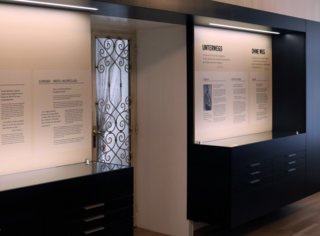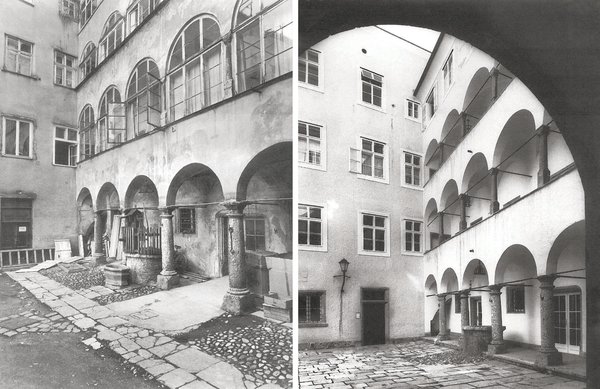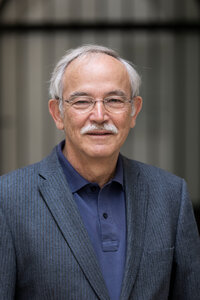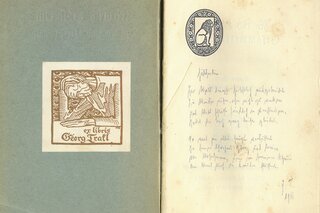
From the Memorial to the Trakl Forum
Trakl House

The Waagplatz is historically significant ground. It was already inhabited in Roman times (floor mosaics). In the 12th century, a building on the site of today's Trakl House is first mentioned in documents (1181). Among the changing owners were the Archbishopric of Salzburg, Admont Abbey, an uncle of Salome Alt von Altenau and Kaspar Freysauf, from whom it was acquired in 1815 by the merchant F. A. Schaffner; hence the name "Schaffner House". In 1885 Tobias Trakl rented the rooms on the first floor on the Salzach side from his heirs as a flat for the family. On 3 February 1887, Georg Trakl was born here at half past seven in the evening. In 1893 the family moved into the opposite house at Waagplatz 3.
The "Trakl House" has born this name since the opening of the Trakl memorial in 1973; it is now owned by the province of Salzburg and houses several cultural institutions. On the first floor, the Salzburger Kulturvereinigung set up a memorial in the rooms of the family's former flat. A testamentary donation of memorabilia from the family estate by Mrs. Maria Geipel, the poet's eldest sister, and a small Trakl collection from the Salzburger Kulturvereinigung formed the basis for the facility, which has been continuously expanded since then.
The most important addition was the acquisition of the Trakl estate of Erhard Buschbeck, a school friend of Trakl (1978). It was supplemented by a donation from Prof. Lotte Tobisch-Labotyn in 2008. In 1987, on the occasion of the 100th birthday of Georg Trakl, the memorial was spatially expanded into a research and memorial site.
Custody Dr. Hans Weichselbaum

born 1946 in Freistadt, Upper Austria
Humanist secondary school
Studied History and German in Salzburg ( Dissertation on Georg Trakl)
Gymnasium teacher (1972 - 2010)
Lectureship abroad 1984/85 (Xi'an, PR China)
Director of the literary forum "Leselampe" (1970 - 1984)
Member of the editorial board of the literary magazine SALZ since 1975, several times jury member.
Head of the Georg Trakl Research and Memorial Centre and Managing Director of the International Trakl Forum since 1972.
List of Publications by Dr. Hans Weichselbaum (PDF)
Contact
Dr. Hans Weichselbaum
Head of the Georg Trakl Museum:
trakl-gedenkstaette@kulturvereinigung.com
+43 (0)662 845346-77
History
When the Trakl Memorial was opened in the poet's birthplace in 1973, several measures had already been taken to highlight the importance of the poet, who was born in Salzburg. This included the supervision of the work by the Otto Müller publishing house since 1938 and the establishment of the Georg Trakl Prize for Poetry by the Salzburg provincial government in 1952. In 1957, on the 70th anniversary of his birth, a Trakl fountain from the workshop of Toni Schneider-Manzell was erected in the courtyard of the then tax office in Kapitelgasse; in 1962, the Raimund Society donated a commemorative plaque, which was attached to the former Trakl family residence on the Residenzplatz. It was thought to set up a memorial in this house, with which Mrs. Maria Geipel-Trakl, the poet's eldest sister, would have agreed; she lived in an apartment on the second floor until 1970. However, a notice to the owner of the house thwarted this plan; the house was vacated and Mrs. Geipel-Trakl had to move into a new apartment at the age of 87.
When the province of Salzburg rented a cellar and two floors in the birthplace of Georg Trakl at Rudolfskai in order to house cultural institutions that had to leave the residence, it was possible to make the idea of a Trakl memorial a reality. A larger and two smaller rooms of the apartment in which the Trakl family had lived between 1885 and 1893 and in which Georg Trakl was born on 3 February 1887 were planned for this purpose. The house was thoroughly renovated, and in the autumn of 1972 various cultural institutions moved into the newly designed rooms, including the Salzburg Cultural Association, which was entrusted by the province of Salzburg with the establishment and care of the planned memorial to the poet.
The basic stock of the equipment consisted of a Trakl collection, which the director of the Raimund Society, Hofrat Dr. Gustav Pichler, had created and sold to the cultural association, and parts of the family heritage, which was still in the possession of Mrs. Maria Geipel-Trakl. She bequeathed it to the Salzburg Cultural Association shortly before her death in autumn 1973, but due to lack of space most of it had to remain in a museum depot for the time being.
On April 10, 1973, the memorial was officially handed over to the Salzburg Cultural Association by Governor DDr. Hans Lechner during a ceremony. Mrs. Maria Geipel-Trakl was present as guest of honour at this event. The author of these lines, who had just completed his studies in German language and literature at the time, was already employed as a part-time curator. The most important task was and is to provide the public interested in Trakl's person and work with information about the poet. Guided tours were set up for this purpose, during which the exhibits (poems, sketches, photos, documents, utensils, etc.) provided an insight into the origin and uniqueness of the poem. A slide show, which has been available since 1987 and was redesigned in 2008, also serves this purpose.
Efforts to expand the stock of documents have not been without success. In 1978, the majority of Georg Trakl's letters to his childhood friend Erhard Buschbeck from the property of Prof. Lotte Tobisch in Vienna were acquired, later also the Trakl manuscripts of the Salzburg Glaser family. Individual documents could be purchased through auction houses or from private collections. This would not have been possible without the financial commitment of the Salzburg Cultural Association (in particular its Secretary General, Dr. Heinz Klier, had understanding for this). Due to the sharp rise in the price of Trakl manuscripts, however, their purchase is increasingly reaching financial limits. Unfortunately, it has not yet been possible to merge other Trakl documents located in Salzburg, in particular those of the Salzburg Museum, with the holdings of the memorial. Fortunately, in 2008 Prof. Lotte Tobisch generously donated the remaining Trakl documents from the Buschbeck estate of the memorial as a gift.
The archive, which has been built up over the years, now contains various Trakl editions, the magazine "Der Brenner" (closed) and the extensive secondary literature on the person and work of Georg Trakl. In addition, there are translations (complete works or a selection of poems) in over 30 languages, illustrations by various graphic artists on Trakl texts and literature related to Georg Trakl. There are screening possibilities for Trakl's texts and for films or video recordings of plays about Georg Trakl. When in 1987 the historical-critical complete edition of Trakl's works was reissued, the memorial was able to make a considerable contribution to the improvement and expansion of the archive material. The relevant material was made available for the facsimile edition of the Brenner Archive ("Innsbruck Edition"). The last of six volumes was published in 2014. The archive is available to all those who wish to obtain more detailed information about the poet. Students from Germany and abroad and several translators have worked here so far. The writer Franz Fühmann also informed himself "on the spot" about Trakl when he wrote his sensational book "Der Sturz des Engels" ("The Fall of the Angel"). Again and again poets and writers were among the visitors of the memorial, which led the strong interest in Trakl into this house. Statements on publications about the poet, films or plays were requested from various institutions. Cultural institutes and educational institutions abroad were grateful if they could be supported with ideas and material for Trakl events; thus organisers in London, Rome, Ghent, Milan, Strasbourg, Lviv, Krakow, Athens and Paris could be helped. Proposals have been made for the placement of poetry panels in Salzburg, nine of which are currently in the city area, one in Anif. They were financed by the magistrate or the municipality of Anif. A brochure with the 'Salzburg' poems of Georg Trakl in German and English provides an overview with a short commentary. A leaflet "Wege mit Georg Trakl" is a signpost for Trakl places in the city. The annual "literRADtour" of the Literaturhaus is often seen as a guided tour to such places.
When in 1977 the First Salzburg Trakl Symposium (together with the French Cultural Institute) produced scientifically remarkable results, it became clear that it was beyond the scope of a simple poet memorial. The scientific view of life and work was mostly represented in the annual events on the anniversary of birth and death, but a foundation for the expansion of the memorial to a research site was laid with the founding of the International Trakl Forum in 1987 on the centenary of the poet's birth. Since then, an advisory board with representatives from various institutions has accompanied the programme of events at the research and memorial site. The previous chairmen were Prof. Dr. Adrien Finck from Strasbourg (1987 - 1993), Prof. Dr. Alfred Doppler from Innsbruck (1994 - 2015) and Prof. Dr. Johann Holzner (since 2016). The corresponding members establish the connection to foreign countries; they came from Switzerland, Hungary, Belgium, England, Poland, Germany, USA, Canada and Japan. At the Japanese Nihon University, a Trakl Society ensures the dissemination of the work in the local language area. The Trakl Forum is supporting this work.
Since the Forum was founded, six further conferences have taken place (1988, 1991, 1995, 2000, 2003, 2014), the results of which have mostly been published as volumes of the "Trakl Studies". The editors of these studies are members of the International Trakl Forum. The author of these lines has been involved with Trakl's life, resulting in an extensive Trakl biography with texts and pictorial documents; it was first published in 1994 and was re-edited in 2014. Another volume by him deals with the history of the Georg Trakl Prize for Poetry. With these activities, the additional designation as a "research centre" is probably justified.
Since 1987, the research and memorial site has also had further rooms at its disposal, which have been adapted by the Salzburg Cultural Association with great financial commitment. Especially for groups and school classes it was difficult to follow the information in an appropriate way. Since then, a slide show has provided an insight into the life and work of the poet. This larger room is also used for lectures and readings. The remaining furnishings owned by the Trakl family have now been accommodated in the "historical room", so that visitors can gain a certain impression of the atmosphere in which the poet spent his childhood and youth. A book table provides information on current Trakl editions and the latest publications on his life and work. Visitors also have the opportunity to purchase lecture texts, poem and postcards, and several CDs on which 15 different interpreters present poems and letters by Georg Trakl. A facsimile edition of Trakl's first volume of poems is particularly popular.
Even if most guests appreciate the seclusion of the place because it allows them to reflect and reflect in the otherwise turbulent old town, it would be desirable if even more people, especially from the surrounding area, made use of this offer, because this place does not need to shy away from comparison with other well-known poet memorials.
Dr. Hans Weichselbaum
Brochure„50 Jahre Georg-Trakl-Forschungs- und Gedenkstätte“
In April 1973, a memorial to the internationally best-known poet from Salzburg was established in the house where Georg Trakl was born on Rudolfskai (now the "Trakl House"), which had been acquired by the Province of Salzburg, and its care was entrusted to the Salzburger Kulturvereinigung. Trakl's 90-year-old oldest sister, Maria Geipel-Trakl, was present at the opening. Since then, interested visitors have been able to learn about the life and work of the poet through guided tours. In addition, there have been a number of events focusing on various aspects of his life and work and its impact: lectures, readings, conferences with an international cast, performances, Trakl Prize winners, etc. A new brochure, vividly designed with many illustrations, provides information about all these activities over the past 50 years.
Text: Dr. Hans Weichselbaum
Layout: Laura Wolfesberger
Georg Trakl Archive
The archive of the Georg Trakl Museum contains the following holdings:
- Trakl editions: from the first editions to the new Innsbruck Trakl Edition.
- Translations: Translations of the complete works or of a varying selection of them into 31 languages.
- Complete works or extensive translations in: English, Dutch, Danish, Russian, Polish, Ukrainian, Italian, Spanish, Catalan, French, Romanian, Hungarian, Japanese, Greek, Georgian.
- Selected translations: Norwegian, Swedish, Flemish, Frisian, Gaelic, Czech, Slovak, Serbo-Croatian, Slovenian, Serbian, Portuguese, Turkish, Lithuanian, Arabic, Korean, Chinese.
- Secondary literature: publications in book form and a collection of important essays.
- Literature by and about Trakl's contemporaries
- Films about Georg Trakl
- Examples of visual artists' engagement with the work of Georg Trakl
- Examples of Trakl settings, some of which include musical scores
- Literature by the Trakl Prize winners (since 1952)
Publications
Available for visitors staying at the research and memorial site:
Georg Trakl: Die 'Salzburg'-Gedichte.
Broschüre zu den neun Gedichttafeln in Salzburg und Anif. (€ 4,-)
Georg Trakl: Gedichte.
Faksimile-Druck des ersten Gedichtbandes, erschienen 1913 im Kurt Wolff Verlag in Leipzig (€ 8,-)
Hans Weichselbaum (Hg.): Georg Trakl, Dichtungen und Briefe. Salzburg 2020.
Historisch-kritische Neuausgabe (€ 39,-)
Broschüren mit Vorträgen über Georg Trakl bei Veranstaltungen im Trakl-Haus
(je € 1,50)
- Kemper, Univ.Prof. Dr. Hans-Georg (Tübingen): „Gestörter Traum“ – Zur Interpretierbarkeit von Georg Trakls Lyrik. (1974/1999)
- Benedetti, Univ.Prof. Dr. Gaetano (Basel): Ein Schicksal der radikalen Verzweiflung (1976)
- Finck, Univ.Prof. Dr. Adrien (Straßburg): Trakl in Frankreich (1987/2000)
- Braungart, Univ.Prof. Dr. Wolfgang (Bielefeld): Zwischen Protestantismus und Katholizismus: Zu einem poetischen Strukturprinzip der Lyrik Georg Trakls (1999)
- Neun Vorträge und Projektberichte zum Thema: Die Dichtung Georg Trakls im Unterricht (2001), € 3,--
- Kleefeld, Dr. Gunther (Freiburg i. Br.): Mysterien der Verwandlung. Das okkulte Erbe in Georg Trakls Dichtung (2009)
- Thauerer, Dr. Eva (Passau): Trakl verstehen. Problematische Annäherungen und ein erfolgversprechender Zugang (2010)
- Fink, Univ.Prof. Dr. Adrien Finck (Straßburg): 'De profundis' - Versuch einer intertextuellen Erläuterung. (1998)
- Doppler, Univ.Prof. Dr. Alfred (Innsbruck): Georg Trakls Gedichte in Beziehung zur Kunst und Literatur seiner Zeit. - Bemerkungen zur Intertextualität. (1998, ergänzt 2012)
- Doppler, em. Univ. Prof. Dr. Alfred (Innsbruck): „Helian“ – eine lyrische Klangrede in vier Teilen und einer Coda. (2016)
- Reisinger, Univ.Prof. Dr. Roman (Salzburg): Der französische Symbolismus und seine Ausstrahlung auf deutschsprachige Lyrik des frühen 20. Jahrhunderts. (2014)
CDs
Georg Trakl. Dichtungen und Briefe
Sprecher: Horst Ch. Beckmann, Wolfram Besch, Gerd Böckmann, Rolf Boysen, Karl Walter Diess, Wolfgang Gasser, Hans Peter Hallwachs, Christine Ostermayer, Will Quadflieg, Otto Sander, Aglaja Schmid, Karl Michael Vogler, Oskar Werner, Bernhard Wicki, Stefan Wigger
59 Min.
Internationales Trakl-Forum der Salzburger Kulturvereinigung in Zusammenarbeit mit dem ORF Landesstudio Salzburg
(€ 16,-)
"Offenbarung und Untergang" - Führmanns Kontroverse mit Trakl
Hörbuch von und mit Klaus Löwitsch
Mit Musik von Markus und Simon Stockhausen, Jo Thönes, Gary Peacock, Fabrizio Ottavucci sowie Zoro Babel
2 CDs, 83 Min.
(€ 22,-)
"Sebastian im Traum" von Georg Trakl. Ein Big-Band-Projekt
Ben Pascal, Komposition; Christoph Cech, Musikalische Leitung
(€ 15,-)
Gedichte - Georg Trakl
Stimme: Elvira (Barbara Maria Bernhard); Aufnahme und Musik: Michael Schallmayer; Fotos: Roberto Superiori; Grafik: Peter Hirth
Wien, 2016
(€ 15,-)
Mitglieder des Internationalen Trakl-Forums als Autoren oder Herausgeber folgender Trakl-Studien im Otto Müller Verlag Salzburg (im Buchhandel erhältlich):
- Wetzel, Heinz: Konkordanz zu den Dichtungen Georg Trakls. (Trakl-Studie VII, 1971)
- Salzburger Trakl-Symposion 1977. Hg. Walter Weiss und Hans Weichselbaum. (Trakl-Studie IX, 1978)
- Trakl-Forum 1987, Hg. Hans Weichselbaum. (Trakl-Studie XV, 1988)
- Trakl in fremden Sprachen. Hg. Adrien Finck und Hans Weichselbaum (Trakl-Studie XVII, 1991)
- Antworten auf Georg Trakl. Hg. Adrien Finck und Hans Weichselbaum (Trakl-Studie XVIII, 1992)
- Deutungsmuster. Salzburger Treffen der Trakl-Forscher 1995. Hg. Hans Weichselbaum und Walter Methlagl (Trakl-Studie XIX, 1996)
- Doppler, Alfred: Die Lyrik Georg Trakls. Beiträge zur poetischen Verfahrensweise und zur Wirkungsgeschichte. (Trakl-Studie XXI, 2002)
- Androgynie und Inzest in der Literatur um 1900. Hg. Hans Weichselbaum. (Trakl-Studie XXIII, 2005) – vergriffen
- Kleefeld, Gunther: Mysterien der Verwandlung. Das okkulte Erbe in Georg Trakls Dichtung. (Trakl-Studie XXIV, 2009)
- Kemper, Hans-Georg: Droge Trakl. Rauschträume und Poesie. (Trakl-Studie XXV, 2014)
- Uta Degner, Hans Weichselbaum, Norbert Christian Wolf (Hrsg.): Autorschaft und Poetik in Texten und Kontexten Georg Trakls (Trakl-Studie XXVI, 2016)
Im Innsbrucker Studienverlag ist erschienen:
- Trakl-Echo. Poetische Trakl-Spuren aus 100 Jahren (Im Buchhandel: € 19,90)
Im Otto Müller Verlag:
- Weichselbaum, Hans: Georg Trakl. Eine Biographie (2014), € 24/E-Book 19,99








